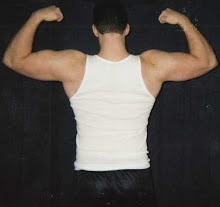Water Intake
By John M Berardi
Adequate water is an important part of any athletic regimen but it is often neglected. How much water is needed is a controversial topic in the popular literature. Let's look to the science.
When looking at the research, there is a recent paper in the Journal of the American Dietetics Association (Volume 99, number 2, pages 200-206, 1999) that discusses water needs. In this paper, the author states that:
" To be well hydrated, the average sedentary adult man must consume at least 2,900 mL (12 c) fluid per day, and the average sedentary adult woman at least 2,200 mL (9 c) fluid per day, in the form of noncaffeinated, nonalcoholic beverages, soups, and foods. Solid foods contribute approximately 1,000 mL (4 c) water, with an additional 250 mL (1 c) coming from the water of oxidation."
The authors also state that "Dehydration of as little as 2% loss of body weight results in impaired physiological and performance responses."
So it appears that in sedentary individuals the equivalent of about 12 cups of water per day are necessary (4 cups come from food, 1 cup from metabolism, and 7 cups from fluid intake). In fact, a few correlational studies have shown that individuals consuming this amount of water per day are less likely to suffer from:
• urinary stone disease
• breast cancer
• colon cancer
• urinary tract cancer
• childhood and adolescent obesity
• mitral valve prolapse
• salivary gland disorders
So for sedentary individuals, you should shoot for about 7 cups of water per day if consuming near your calorie needs.
As far as athletes, there is good research showing that dehydration seriously impairs mood, intensity, strength, and endurance. Although there is very little research looking at how much fluid is needed to prevent dehydration in athletes, the Guyton Textbook of Medical Physiology the following table showing the amount of water lost in the average 70kg athlete (154lb) in different exercise and non-exercise conditions:
Normal Weather -
No exercise
(68° F) Warm Weather -
No exercise
(85° F) Exercise in Warm
Weather (85° F)
Insensible Sweat Loss
- Skin 350 mL 350 mL 350 mL
- Respiratory Tract 250 mL 350 mL 650 mL
Urine 1400 mL 1200 mL 500 mL
Feces 100 mL 100 mL 100 mL
Sweat 100 mL 1400 mL 5000 mL
Total 2,300 mL (2.3L) 3,300 mL (3.3L) 6,600 mL (6.6L)
From this table it appears that although athletes will be getting more water from foods and will be making more "metabolic water" due to cellular metabolism, this probably is not enough water to support the higher levels of muscle mass, metabolic activity, and the higher sweating rates of more active people. Especially in warm weather climates. So more water may be necessary.
Since the first study I mentioned study proposed the idea that about 3L (12 cups) of water per day might be necessary for adequate hydration in sedentary individuals and that about 1.25L (5 cups) come from food and as a byproduct of metabolism, that means that 1.75L (7 cups) should be consumed per day.
Assuming that athletes are eating more food than the average person eats and that they have a higher metabolic rate, they might be getting about 2L (8 cups) per day from food and metabolism. Their water needs on training days, however are probably higher so drinking 2 additional liters (8 cups) of water per day might get the job done if they don't live in warm weather climates. If living in warm weather climates, drinking an additional 4 liters (16 cups) might be necessary on training days. Base your water intake on your climate, sweat rates, and your activity levels. Remember the above examples are based on a 70kg athlete. If you're bigger, you may need more.
Bottom line: on non-training days, it appears that ½ gallon of additional water is adequate in both warm and "normal" climates. On training days, however, you may require a gallon or more water per day to stay adequately hydrated.



0 Comments:
Post a Comment
<< Home